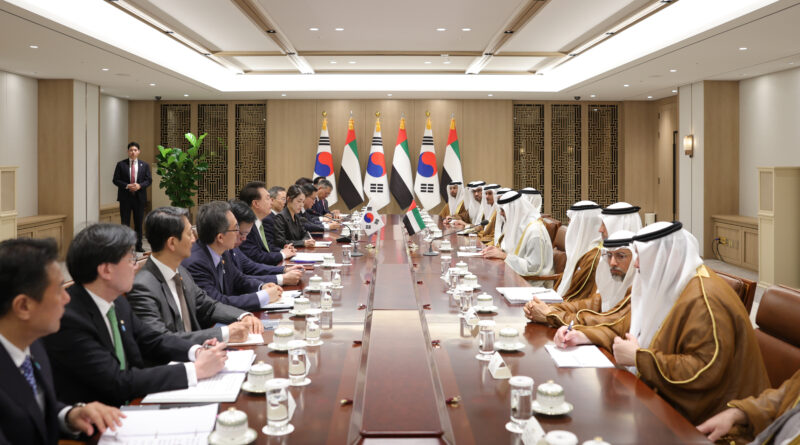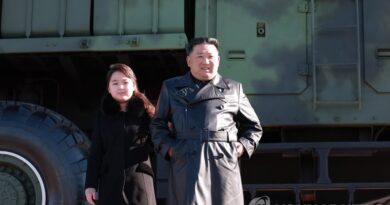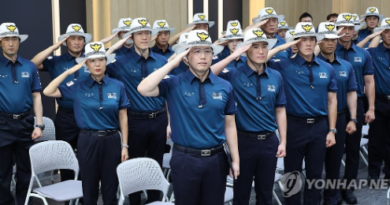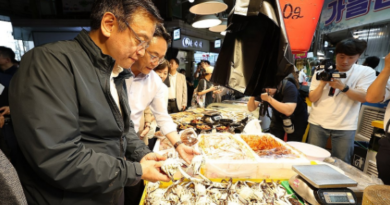A ‘new Middle East boom’ is approaching, starting with comprehensive economic cooperation with the United Arab Emirates (UAE).
Wednesday, May 29. Minister of Trade, Industry and Energy Ahn Deok-geun and UAE Foreign Trade Minister Thani bin Ahmed Al Zeyoudi officially signed the Korea-UAE CEPA in the presence of the leaders of the two countries at the Yongsan Presidential Office on this day. The signing ceremony was held about seven months after the negotiations were concluded in October last year.
* Comprehensive Economic Partnership Agreement (CEPA): A free trade agreement similar to FTA, which includes strengthening comprehensive cooperation in addition to opening the product and service markets between the two countries.
Korea-UAE CEPA was promoted in earnest following President Yoon Seok-yeol’s state visit to the UAE in January last year, and was concluded in October last year after intensive negotiations between the two governments. Since then, the government has been carrying out domestic procedures necessary for formal signing, including legal review of the agreement, preparation of a Korean version, and review by the Ministry of Government Legislation.
The government plans to speed up the follow-up measures to the Korea-UAE CEPA signed on this day and submit a ratification motion to the National Assembly as soon as possible. After completing each country’s domestic legal procedures for ratification and entry into force of the Korea-UAE CEPA, the two countries will exchange written notifications certifying this, and the Korea-UAE CEPA will enter into force on the first day of the second month after the date of receipt of the written notification.
As of 2023, the UAE is Korea’s 14th largest trading partner * (28th in exports, 9th in imports). We mainly export industrial products such as automobiles, automobile parts, electronic devices, and synthetic resins, and mainly import energy, resources, and raw materials essential for domestic industry, such as crude oil, petroleum products, natural gas, aluminum, and copper products, from the UAE. The UAE is a logistics hub that connects not only the Middle East but also Africa and South Asia, and is expected to be of great help in expanding the expansion of Korean companies in this region.
* (Trade size) 9.4 billion in `20 → 11.3 billion in `21 → 19.5 billion in `22 → 20.9 billion in `23
** As of 2023, about 178 Korean companies entered the market, including manufacturing (55), service (33), and construction (31).
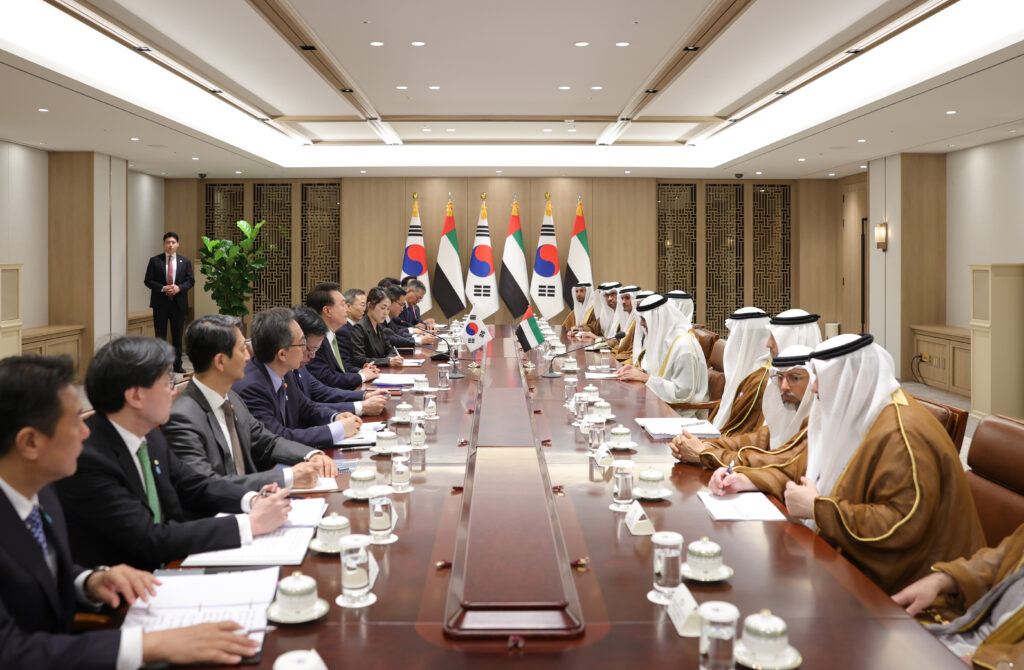
[ Korea -UAE CEPA main contents and expected effects ]
❶ (High level of product market opening → Market preoccupation effect) Through Korea-UAE CEPA, both countries will open their product markets at a high level * .
* Market openness level: (based on number of items) Korea 92.5%, UAE 91.2%, (based on import amount) Korea 72.3%, UAE 82.0%
As for most weapons, which are our main export products to the Middle East, tariffs will be eliminated in the UAE market immediately after the agreement comes into effect, so exports are expected to increase due to the rapidly growing demand for defense products in the Middle East. In addition, tariffs on many types of machinery, such as rolling mills and metal casting machines, will be eliminated within 5 years, and on items such as automobiles, parts, and home appliances (refrigerators, washing machines, and air conditioners), tariffs will also be eliminated within up to 10 years after the effective date. As a result, export conditions for Korean companies have been significantly improved compared to major competitors such as the US, EU, Japan, and China, which have not yet signed a CEPA with the UAE. In particular, tariffs on eco-friendly vehicles such as electric vehicles and hybrid vehicles, which have great growth potential in the future, will be abolished within a maximum of 10 years after the effective date , and among trucks and special vehicles, a significant number of dump trucks and loading vehicles will be abolished immediately, contributing to the construction market boom in the Middle East. We can expect a boost in exports.
* Electric vehicles : Large vehicles (10 or more people), trucks – immediately abolished / Passenger vehicles – abolished within 10 years
Hybrid cars : phased out within 10 years
Tariffs were also abolished on various other promising export items, laying the foundation for export market diversification. Not only industrial products such as medical devices, pharmaceuticals, cosmetics, and LED lighting devices, but also major agricultural and marine products such as beef, chicken, fresh fruits, ginseng, seasoned seaweed, anchovies, and abalone will also benefit from tariff elimination.
❷ (Abolition of crude oil import tariffs → Contribution to price stability) Import tariffs on crude oil from the UAE will be gradually abolished over 10 years after the effective date (existing 3% → 0%), and the import tariff on naphtha, the main raw material for petrochemical products, will be reduced to 5%. It will be gradually reduced by half over the years (existing 0.5% → 0.25%). This is expected to improve the price competitiveness of the domestic petrochemical industry and stabilize domestic prices.
❸ (Open service market → Expand opportunities for companies to enter the market and spread K-content) The UAE was the first to open online game services, which were not open under FTAs with other countries, under the Korea-UAE CEPA. We have secured the legal stability of our corporate activities when supplying game services online to the Middle East or when related companies enter the local market directly. In addition, we decided to allow local openings and remote medical treatment at our medical institutions, and to open postpartum care and physical therapy services.
* The UAE’s average monthly spending on Korean games is $68.98 (Middle East average $38.51), and the game usage time in the Middle East is 159 minutes on weekdays/218 minutes on weekends (Korea Creative Content Agency)
❹ (Including various areas of cooperation → Laying the foundation for comprehensive economic cooperation) In this Korea-UAE CEPA, 14 areas of cooperation * , including new trade agendas such as energy, supply chain, digital, and bio economy , are specified to promote future-oriented economic cooperation between the two countries. To accelerate this, a comprehensive economic cooperation system has been established.
* Energy and resources, high-tech industry, circular economy, audiovisual services and co-production, smart farm, health industry, tourism, transportation, maritime transportation, digital economy and trade, precious metals, supply chain, competition, bio economy
In particular, unlike the CEPA that the UAE has previously signed with other countries, it includes cooperation on energy and resources, including alternative and renewable energy.
❺ (Improvement of trade norms → Enhancement of convenience for business activities) In addition, through Korea-UAE CEPA, trade norms applied in the trade process between the two countries, including customs clearance, government procurement, digital trade, and intellectual property rights, were improved. By introducing a pre-screening system for customs clearance of goods, both countries have been able to increase predictability and reduce costs for exporting companies. The procurement markets of the UAE and major central government agencies, which are non-members of the WTO Government Procurement Agreement, were opened and the principles of transparency and non-discrimination were reflected. Regarding digital trade, the UAE was the first country to allow cross-border information transfer. Through this regulation, Korean companies operating in the UAE can transfer information collected locally to the country. In addition, high-level intellectual property rights protection norms were introduced to enable effective response measures against copyright and trademark infringement by Korean companies.
Editor Jun Beom





